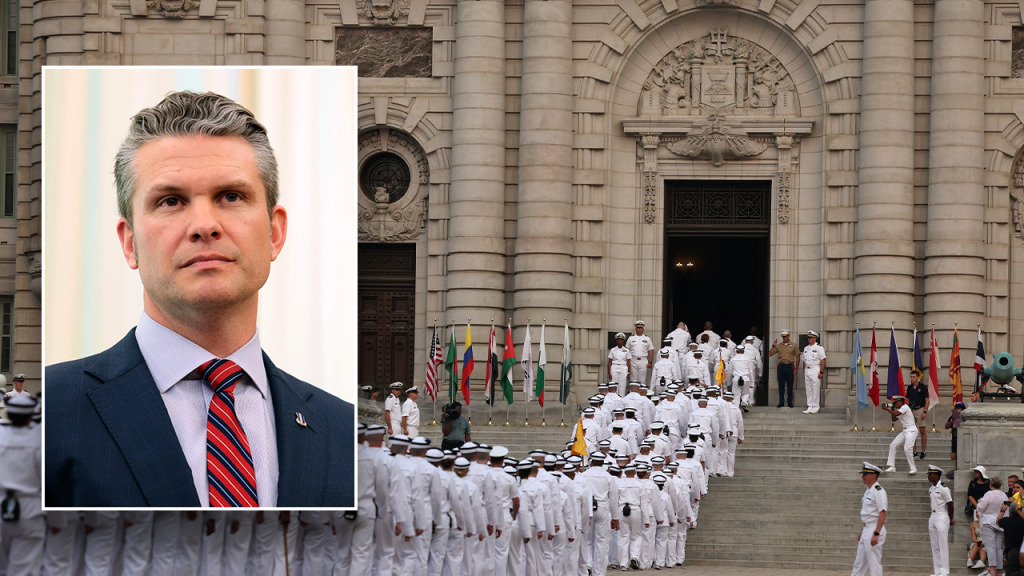In a significant move, the U.S. Naval Academy in Annapolis, Maryland, has announced the removal of nearly 400 books from its Nimitz Library, aligning with directives issued under the Trump administration aimed at eliminating content related to diversity, equity, and inclusion (DEI). A spokesperson for the Navy confirmed the action, stating it is part of compliance measures with executive orders aimed at reshaping educational content within federal institutions. This decision has raised questions regarding academic freedom and the implications for educational materials that support varied perspectives within military training.
| Article Subheadings |
|---|
| 1) Overview of the Book Removals |
| 2) The Context of DEI and Executives Orders |
| 3) Impact on the Naval Academy’s Academic Environment |
| 4) Wider Implications for Other Military Academies |
| 5) Conclusion and Future Outlook |
Overview of the Book Removals
The U.S. Naval Academy’s recent decision to remove almost 400 books from its library collection has generated considerable discussion and concern. The Nimitz Library, which houses around 590,000 print books in total, is now experiencing a content reassessment reflecting the adherence to federal directives. A Navy spokesperson communicated that this action is part of a broader compliance effort to align library resources with executive orders issued by the President. Yet, specific details regarding the titles and categories of the removed books have not been publicly divulged, leaving many to wonder about the implications of this censorship.
The Context of DEI and Executives Orders
The directive for the book removal is rooted in a series of executive orders signed by former President Trump aimed at curtailing diversity, equity, and inclusion initiatives across federal agencies and educational institutions. Notably, an order issued in January explicitly restricts K-12 institutions receiving federal funding from incorporating DEI content in their curriculum. While the U.S. military academies were initially exempt, the changing political climate has pushed variables under scrutiny, prompting action from officials like Secretary of Defense Pete Hegseth. Critics argue that such measures jeopardize academic freedom and limit exposure to a diverse array of ideas critical in military training environments.
Impact on the Naval Academy’s Academic Environment
The removal of DEI-related content from library resources could fundamentally alter the academic landscape at the Naval Academy. Critics of the move express concern that reducing the diversity of perspectives available to midshipmen could hinder their intellectual development and preparedness for future leadership roles in a multicultural military setting. Traditionally, the Naval Academy has prided itself on fostering critical thinking and a broad understanding of various societal issues. By specifying what materials are considered acceptable, the institution may inadvertently narrow the ideological framework through which future leaders are educated.
Wider Implications for Other Military Academies
While the U.S. Naval Academy’s actions are currently a focal point, they may set a precedent for other military academies under the Department of Defense. The Pentagon’s overarching directives to eliminate DEI resources could spread across institutions intended to develop the nation’s military leaders. Given the significance of a diverse and inclusive atmosphere in military training, the implications of this initiative extend beyond academia into broader discussions on military readiness and the composition of the armed forces. Institutional leaders at the Air Force and Military Academies may face pressure to align with similar compliance measures, prompting a nationwide dialogue about the future of education within federal capacities.
Conclusion and Future Outlook
As the situation unfolds, the balance between compliance with federal directives and the preservation of academic integrity remains a crucial discussion point. The U.S. Naval Academy’s decisions reflect a challenging era for educational institutions navigating political currents. Observers will be watching closely to see how midshipmen, faculty, and the broader educational community react to these changes. Future efforts may aim to restore some degree of diversity in materials or at least advocate for a model that fosters open dialogue and inclusion. The intersection of politics and education within the military context may reveal both the challenges and opportunities for reform in the coming years.
| No. | Key Points |
|---|---|
| 1 | The Naval Academy removed nearly 400 books to comply with executive orders against DEI content. |
| 2 | The Pentagon is applying federal guidelines to shape educational content within military institutions. |
| 3 | Concerns are raised about how the removal of DEI materials may impact academic freedom and leadership development. |
| 4 | The policy could extend to other military academies, prompting a nationwide examination of educational practices in the military. |
| 5 | Future discussions may aim at finding a compromise that maintains academic integrity while adhering to federal mandates. |
Summary
The U.S. Naval Academy’s initiative to remove books from its library aligns with a broader political agenda targeting diversity initiatives within federal institutions. This significant educational shift reflects not only a compliance measure but also raises fundamental questions regarding academic freedom, diversity of thought, and the future direction of military training. As the ramifications of these decisions unfold, an ongoing dialogue will be essential to address the balance between adhering to directives and fostering an inclusive academic environment.
Frequently Asked Questions
Question: What prompted the U.S. Naval Academy to remove these books?
The removals are in response to executive orders issued by former President Trump, which aim to eliminate diversity, equity, and inclusion content from federal educational institutions.
Question: How does this removal affect midshipmen at the academy?
The removal of books related to DEI may restrict midshipmen’s exposure to diverse perspectives, potentially impacting their intellectual development and readiness for leadership roles in a diverse military environment.
Question: Will other military academies follow the Naval Academy’s lead?
There is a possibility that other military academies may adopt similar measures in response to directives from the Pentagon, which could lead to a wider reassessment of educational materials used across federal institutions.


